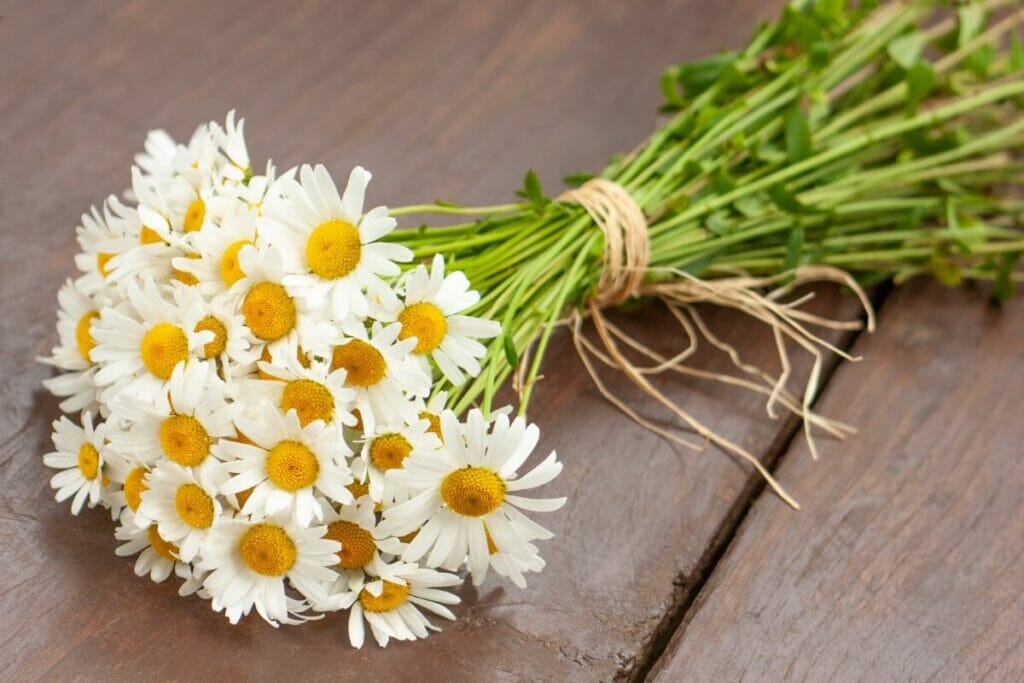Daisy Symbolism in the Language of Flowers
Daisies have bright, sunny faces and symbolism associated with cheerfulness, warmth, and joy. Along with tulips and daffodils, these flowers are ambassadors for springtime and all the themes connected to rebirth and renewal. In this article, we’ll discuss everything you need to know about the daisy flower’s meaning and rich symbolism, with information on the daisy’s history and origins, as well as their cultural significance around the world today.

Key Takeaways
In the language of flowers, daisies symbolize new beginnings and rebirth, in addition to love, cheerfulness, beauty, purity, innocence, hope, fun, and affection. They’re also commonly given to new mothers as a symbol of childbirth and motherhood. In spirituality, daisies represent faith and eternal life.
Etymological Meaning
The family name Asteraceae comes from the Latin word aster, which means star.
The common name daisy comes from the Old English daeges eage, which means day’s eye. This refers to the daisy’s tendency to open in the morning and close at night.
Meaning of Common Daisy Colors
Broadly, daisies represent rebirth, new beginnings, and hope. Their symbolic meanings, however, shift depending on the type of daisy and its color.
Snowy-white daisies represent purity and innocence. Yellow daisies are strongly associated with cheerfulness, friendship, joy, and wishing someone well or “get well”. Like other pink flowers, pink daisies symbolize gentle admiration, affection, or adoration.
Daisy Flower Origin Stories

According to a Roman myth, the nymph Belides is responsible for the creation of daisies. In the story, Belides transforms herself into a daisy to escape the unwanted affections of Vertumnus, the god of gardens and seasons.
This story is where the common English daisy gets its scientific name, Bellis. The myth is also why daisies sometimes represent chastity and purity while also being associated with transformation or rebirth.
Daisies in Ancient History, Myths, and Folklore
One of the earliest associations of daisies with childbirth comes from the ancient Celtic people. Although it’s darker than the symbolism of motherhood and childbirth attributed to daisies today, the ancient Celts believed that when a child or infant died – especially in childbirth – the gods would cover their graves with daisies in an attempt to console those who were grieving the loss.
Another early association of daisies with childbirth comes from Norse mythology. The daisy flower is associated with the goddess Freya, who is a goddess of fertility, love, and beauty.
Daisies in the Victorian Era

The Victorian Flower Language, or floriography, was a popular form of communication during the Victorian era. It assigned specific meanings to specific flowers, and people used them to communicate with one another through their assigned meanings.
During this time, the daisy officially symbolized loyal love, innocence, and the ability to keep a secret. One could literally translate a daisy’s presence in a bouquet to the phrase, “I’ll never tell.”
Religion and Spirituality
In spirituality, daisies represent faith and eternal life. As a symbol of rebirth, they’re also associated with reincarnation. They symbolize the ability to be forgiven for past mistakes and begin again, renewed.
In Christianity, daisies are closely associated with the Virgin Mary, representing motherhood, innocence, chastity, purity, and humility.
Art and Literature
Daisies blossom everywhere in art and literature. Their cheerful faces pop up in paintings from artists around the world. Literary greats, such as F. Scott Fitzgerald, Henry James, and Johann Wolfgang von Goethe, have given the flower’s name to their heroines too.
Gifting Occasions for Daisy Flowers

There are several appropriate occasions for giving daisies as a gift. They’re the birth flower of April, making them a perfect gift for celebrating an April birthday. Gerbera daisies are the official flower for the fifth anniversary.
With their symbolic meaning of hope, rebirth, and renewal, they’re also an excellent flower for Easter bouquets, springtime celebrations, and get-well flower arrangements. Bring a bouquet of daisies as a host or hostess gift to any springtime gathering.
Daisies are also traditionally gifted to new mothers as they symbolize childbirth and motherhood. This makes them appropriate for congratulating new mothers and also as a gift for celebrating the maternal figures in your life on Mother’s Day.
The Final Word
It’s not surprising that daisies are one of the world’s favorite flowers. The common daisy is rich in meaning and symbolism, with ancestral links dating back through the centuries. There’s nothing quite like the renewed spirit of hope that early-blooming daisies can bring to a garden in spring or to a flower bouquet in the dead of winter.
Andrew is the Editorial Director at Petal Republic. He holds a BSc degree in Plant Sciences and has trained professionally at leading floristry schools in London and Paris. In amongst overseeing a global editorial team, Andrew's a passionate content creator around all things flowers, floral design, gardening, and houseplants.
